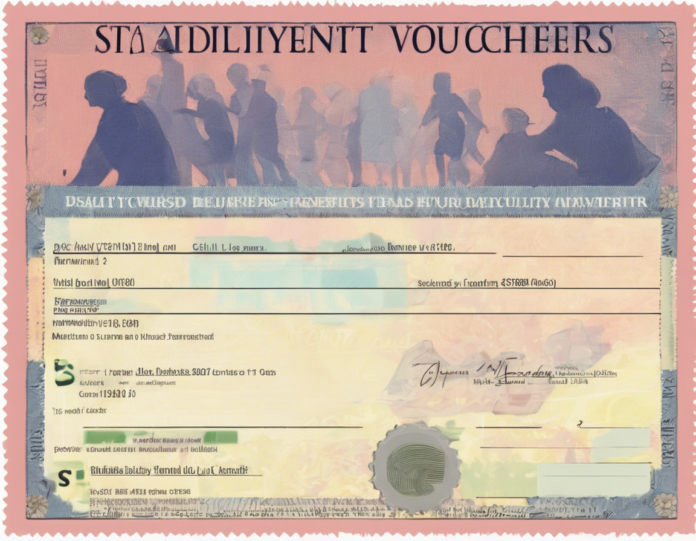Living with a disability can pose numerous challenges, from navigating daily tasks to managing financial responsibilities. In many cases, individuals with disabilities are entitled to various benefits and services to help support their needs. One such benefit that can be incredibly valuable is disability vouchers, which can provide financial assistance for a range of essential services and supports. In this comprehensive guide, we will delve into the world of disability vouchers, exploring what they are, who is eligible, how to apply, and much more.
What are Disability Vouchers?
Disability vouchers, also known as disability benefits or assistance programs, are financial supports provided by federal, state, or local governments to individuals with disabilities. These vouchers are designed to help offset the costs associated with living with a disability, such as medical expenses, assistive devices, transportation, housing modifications, and more. The aim of these vouchers is to improve the quality of life for individuals with disabilities and their families by ensuring access to essential services and supports.
Who is Eligible for Disability Vouchers?
Eligibility for disability vouchers varies depending on the specific program or benefit. In general, individuals who have a documented disability that significantly impacts their daily functioning and quality of life may qualify for disability vouchers. Additionally, some programs may have specific age, income, or residency requirements. It’s essential to research and understand the eligibility criteria for each program to determine if you qualify for assistance.
Types of Disability Vouchers
There are several types of disability vouchers and assistance programs available to individuals with disabilities. Some common types include:
1. Medicaid Home and Community-Based Services (HCBS) Waivers
Medicaid HCBS waivers provide funding for services that allow individuals with disabilities to receive care at home or in a community setting rather than in an institution. These services may include personal care, respite care, adult day programs, assistive technology, and more.
2. Supplemental Security Income (SSI)
SSI is a federal income supplement program that provides cash assistance to individuals with disabilities who have limited income and resources. The program is designed to help meet basic needs such as food, shelter, and clothing.
3. Housing Choice Voucher Program (Section 8)
The Housing Choice Voucher Program, also known as Section 8, assists low-income individuals and families, including those with disabilities, in obtaining affordable housing. Participants receive vouchers that subsidize their rental payments, making housing more accessible and affordable.
4. Vocational Rehabilitation Services
Vocational rehabilitation programs provide a range of services to help individuals with disabilities prepare for, secure, and maintain employment. These services may include job training, career counseling, assistive technology, and job placement assistance.
How to Apply for Disability Vouchers
Applying for disability vouchers can vary depending on the specific program or benefit. In general, the following steps can help guide you through the application process:
-
Research available programs: Begin by researching the various disability voucher programs available in your area. Identify the programs that align with your needs and eligibility criteria.
-
Gather necessary documentation: Most programs will require documentation to verify your disability, income, residency, and other eligibility requirements. Gather all necessary documents, such as medical records, identification, financial statements, and proof of residency.
-
Complete the application: Fill out the application form for the desired program carefully and accurately. Be sure to provide all requested information and documentation to avoid delays in the application process.
-
Submit the application: Once your application is complete, submit it to the appropriate agency or organization overseeing the program. Follow up to ensure that your application is received and processed in a timely manner.
-
Await a decision: The processing time for disability voucher applications can vary. Be patient and await a decision on your application. If additional information is needed, respond promptly to any requests from the program administrators.
Frequently Asked Questions (FAQs) about Disability Vouchers
1. Can I receive multiple disability vouchers at the same time?
In some cases, individuals may be eligible for and receive multiple disability vouchers simultaneously, depending on their unique needs and circumstances. However, it’s essential to check the specific program guidelines to understand any potential limitations or restrictions on receiving multiple benefits.
2. Will receiving disability vouchers affect my eligibility for other government assistance programs?
Receiving disability vouchers may impact your eligibility for other government assistance programs that have income or resource limits. It’s crucial to review the guidelines of each program to determine how receiving disability vouchers may affect your overall benefits.
3. Are disability vouchers taxable?
In most cases, disability vouchers are not taxable as income. However, it’s advisable to consult with a tax professional or financial advisor to understand the tax implications of receiving disability benefits in your specific situation.
4. Can family members or caregivers apply for disability vouchers on behalf of individuals with disabilities?
Yes, family members or caregivers can often assist individuals with disabilities in applying for and managing disability vouchers. In some cases, individuals may need to provide written consent or authorization for a family member or caregiver to act on their behalf.
5. What should I do if my disability voucher application is denied?
If your disability voucher application is denied, it’s essential to review the denial notice carefully to understand the reasons for the denial. You may have the option to appeal the decision or provide additional information to support your eligibility. Contact the program administrators for guidance on next steps.
Navigating the world of disability vouchers can be complex, but understanding the available programs, eligibility criteria, and application process is crucial for accessing the support you need. By leveraging these resources and services, individuals with disabilities can enhance their quality of life and achieve greater independence and inclusion in their communities.

